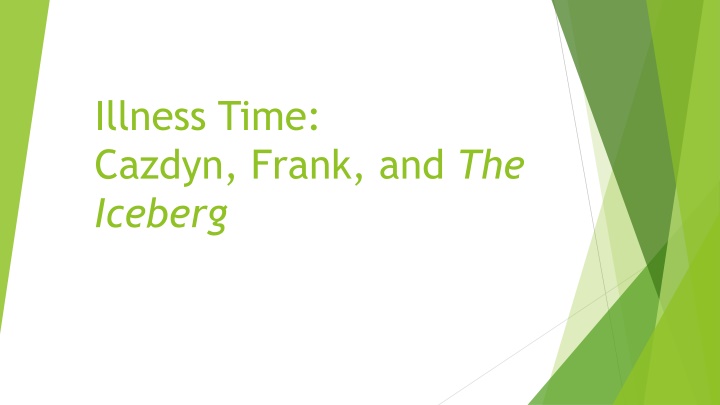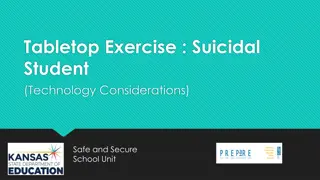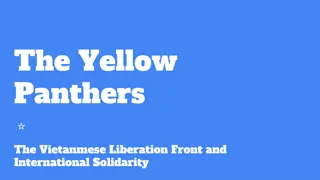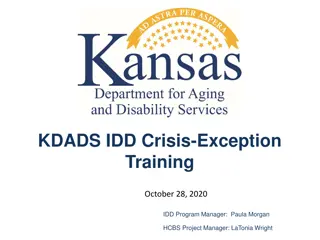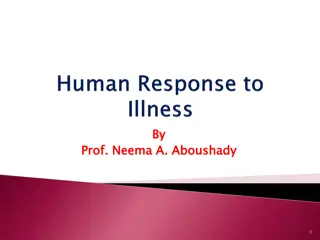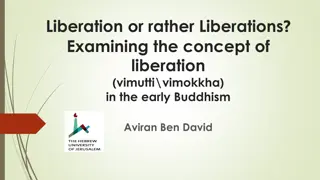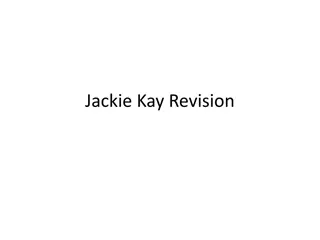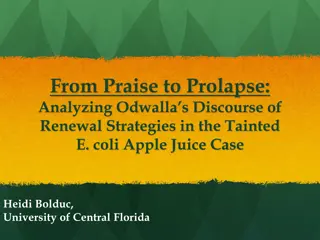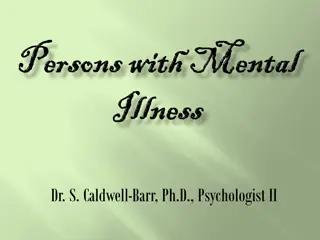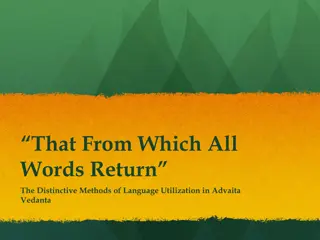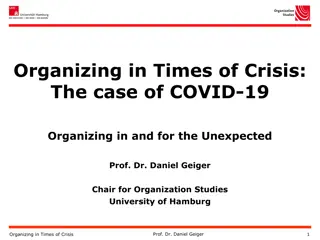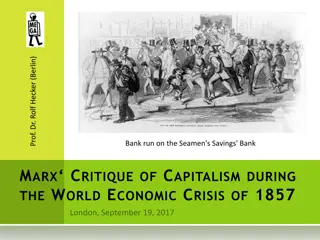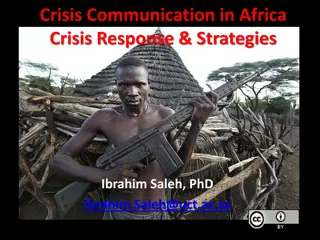Reflections on Illness and Time: Crisis, Transformation, and Liberation
Reflections on the complexities of time in the context of illness and crisis are brought forth in the readings of Cazdyn, Frank, and The Iceberg. The narratives delve into the stretching of time during crises, the interplay between chronic time and the threat of relapse, and the ever-present nature of crisis. Additionally, they explore the impact of disease as an unrelenting force, the coexistence of polarities in emotional states, and the concept of palliative time as a liberation that affirms life amidst destabilization. These profound musings prompt contemplation on how we experience and navigate time amid challenges, uncertainties, and transformations.
Download Presentation

Please find below an Image/Link to download the presentation.
The content on the website is provided AS IS for your information and personal use only. It may not be sold, licensed, or shared on other websites without obtaining consent from the author.If you encounter any issues during the download, it is possible that the publisher has removed the file from their server.
You are allowed to download the files provided on this website for personal or commercial use, subject to the condition that they are used lawfully. All files are the property of their respective owners.
The content on the website is provided AS IS for your information and personal use only. It may not be sold, licensed, or shared on other websites without obtaining consent from the author.
E N D
Presentation Transcript
Illness Time: Cazdyn, Frank, and The Iceberg
Cazdyn and The Iceberg: crisis time the stretching of time, the dull soreness of a meantime with no end [ ] chronic time safe but with the droning threat of relapse (Cazdyn, The Already Dead,13) [But] the future cannot be put off, crisis and disaster cannot be totally managed [ ] and we do not all experience time and the political effects of time in the same way. (14) Capitalism can teach us about how life and death, as well as other apparently opposing terms (health and illness, for example), are not necessarily chronologically ordered, one term preceding another (14). Can you comment on this re. the reading or you experience, or think of another example? Crisis transforms ... from the short term to the long term, in which one is still in dire straits while the immediacy of the danger, has been deferred. In this way, crisis is not something that comes and goes, but is always present. (Cazdyn, The Already Dead, 198) Coutts: we continue in the same way but in parenthesis (Coutts, 13) At one stroke my ambition has gone private and it has a single goal: to keep us as a family alive so that our formation can continue. (Coutts 78) disease is a wave and we are always, always in its wake. Like survivors floating behind we are knocked stupid. We must scavenge, pick things up and construct them anew out of flotsam There is no getting ahead of the wave and imagining our lives enough in advance to prepare, and maybe if we could, then we could not live as we do, held tight and fast. We would simply drown, each alone and separate. Yet somehow, somehow, we still expect our sacred and familiar selves to be spared from oblivion until that endpoint when there is no more time left for us anyway. (187)
Cmon. Play, he says, turning to look at me. Play. I m sad. You can be sad and still play. Is the world of the happy different from that of the unhappy? Both states are true and present, both polarities alive in the same moment, cognisant of each other and coexisting. They map exactly. Within the margins that have been given to us, everything is contained, stuck tight against its opposite in full measure, and the friction between them is what makes the life. You cannot help but notice this. If we were to lose this demarcation, if, say, Dr B phoned today to say it has all been a clinical error, the friction would vanish. It is total, yet weak as surface tension on a drop of water. There would be no way to mentally attain it or to think yourself back into this state. You cannot pretend to live like this. But it makes the old ways seem intolerable, dependent as they are on pretence. (The Iceberg)
Palliative time Liberation, total and absolute! We are free. Very early the day after my encounter with [the palliative nurse] she phones me at home. I have just dropped Ev at nursery and I am staring blindly out of the window, squinting at the shape of the day: same as all the days. Tom has a place in the hospice, he will go today, Palliative says. Eh? She repeats. I am silent. He will leave at 1 p.m. Suddenly I register what my eyes had been looking at before the telephone rang. Bright leaves gold and lime are crowding and waving wildly at the window for my attention on the tree outside [ ] Do you know what this means? It means we have a future. (260-61) a destabilization of the present, a death of the sick body in crisis (currently being managed) that is at the same time a radical affirmation of life. (Cazdyn, 198) The World Health Organization defines palliative medicine as the active total care of patients whose disease is not responsive to curative treatment. Palliative care affirms life and regards dying as a normal process [it] neither hastens nor postpones death provides relief from pain and other distressing symptoms [and] integrates the psychological and the spiritual aspects of care[.] (Cazdyn, 45)
The hospital was vertical. Beneath us, stacked like ballast, was our fellow cargo: layers and layers of the metropolitan sick arranged in dense, industrious warrens of gut, heart, bowel, bone, blood. The hospice is horizontal. Its planes stretch out flat and space is not at a premium. (Coutts, 261) How might this relate to what Cazdyn says about the new chronic , of managed disease? [t]he length of a day is no longer the measure it was. Days are no more use as yardsticks, nor hours, nor afternoons. (Coutts, 144) We have stopped being anywhere at all. We are way outside, out of culture, place, gender. I do not know where we are but I feel very sure of myself here. Time is refreshing itself, that s all. It is simple. Duration is the rope that drags and keeps us. Time is the fundament we have never left, so powerful is its agency and pull, so direct and strange. There is nowhere in the world like it. (Coutts, 291) Think about this in relation to death as radical affirmation . What is Coutts discovering about time through this experience?
Arthur Frank, The Wounded Storyteller the teller of a chaos story is not heard to be living a proper life, since in life as in story, one event is expected to lead to another. Chaos negates that expectation. (Frank ) How far in The Iceberg does Tom s illness make their story difficult to tell? Is there any evidence that it takes them out of the bounds of social propriety, understanding (even if there is no judgement of them made)? What is the effect of the unexpected and in some sense causeless, random nature of Tom s illness on Coutts /their modes of understanding, their experience of time, of living? [t]he modernist bulwark of remedy, progress, and professionalism cracks to reveal vulnerability, futility and impotence.
[Holocaust narratives] the hole in the narrative that cannot be filled in The story traces the edges of a wound that can only be told around. Words suggest its rawness, but the wound is so much of the body, its insults, its agonies, and losses, that words necessarily fail. (Frank, 98) The chaos that can be told in story is already taking place at a distance and is being reflected on retrospectively. For a person to gain such a reflective grasp of her own life, distance is a prerequisite. In telling the events of one s life, events are mediated by the telling. But in the lived chaos there is no mediation, only immediacy. The body is imprisoned in the frustrated needs of the moment. The person living the chaos story has no distance from her life [ ] Lived chaos makes reflection, and consequently story-telling, impossible. (Frank, 98) Coutts is of course highly articulate and has shaped her account of this illness very consciously. The period she is talking about is defined by contingency (chance), however. How far do we recognize any of what Frank is saying about chaos narrative in this work?
Hearing is difficult not only because listeners have trouble facing what is being said as a possibility or a reality in their own lives. Hearing is also difficult because the chaos narrative is probably the most embodied form of a story. If chaos stories are told on the edges of a wound, they are also told on the edges of speech. Ultimately chaos is told in the silences that speech cannot penetrate or illuminate. (Frank, 101) [T]he future eats the present without sentiment [ ] Tom is speaking to me less. [ ] / The way his intellect is being destroyed. Great chunks of speech are collapsing. Holes are appearing. Avenues crumble and sudden roadblocks halt the journey from one part of consciousness to the other. He strings words together like ropes across voids. [ ] (Coutts) The complexity of the problem is so intricate as to be scarcely graspable [.] sometimes miniscule, like drop-out in a piece of digital music, or then surreal, like the wholesale cut and paste of a message spoken in tongues, at which we all stand astonished, including him. It is a traffic jam inching by degrees. When it becomes chronic, everything stalls. (Coutts)
Gilda Radner: The issue of control plagued me. [] despite the war I was waging, and my endurance, I couldn t control the outcome (Radner, 181, cited in Frank, 100) body telling chaos stories [ ] being swept along, without control, by life s fundamental contingency. Efforts to reassert predictability have failed repeatedly, and each failure has had its costs. (Frank, 102) [ ] consciousness has given up the struggle for sovereignty over its own experience. (Frank, 104) [ patient starts to feel treatment both problem and solution (the latter in being kept apart from a world that could not, and would not, understand. )] When liberation from hospital comes, [ ] one s real trouble begins: the trouble of remaking a sense of purpose as the world demands. [ ] Much illness behaviour can only be understood when the would-be interpreter is able to enter imaginatively into a world without purpose. (Frank, 107) How does this bear on the representation (and enactment) of control, and purpose, in The Iceberg? The chaos of illness (and the ruling role of chance in one life) can lead to the pit of narrative wreckage (Frank, 110) which society encourages us to move on from. Might The Iceberg teach us an enhanced tolerance for chaos as part of a life story (Frank, 111)? Think about how The Iceberg certainly (?) shows that we are dyadic bodies - another s body has to do with me, as I with it (Frank, 35, 202) - and that storytelling can be (and perhaps always is) collaborative.
Catherine Malabou, The New Wounded: From Neurosis to Brain Damage (2012) The rupture of trauma (physical or trauma) -- the destruction inherent in the meaningless accident (brain injury, neurodegenerative disease (e.g. dementia) we could add brain tumour) Narrative rupture: cannot ascribe meaning to this chance event Rupture of identity: loss of one s psychic history (memory, particular constitution of drives/ desires/ repressions) after trauma (physiological trauma, but also could result from emotional trauma) Loss of one s identity (e.g. critical interests (Ronald Dworkin), idiolect, tastes, personality , physical appearance/physiology, feelings e.g. negative affect, withdrawal)? Brain has plasticity: can remake itself. This is mostly positive remaking, but it also has possibility negative, destructive plasticity (the remaking of brain physiology, and relatedly of identity, personhood etc.) also something we should look at (says Malabou) Psychoanalysis has not been able to talk to lost persons of physiology, who do not regress but shatter in a moment, display radical discontinuity (rather than narratives of regression, obsession, repression, surfacing memory etc.) Malabou wants to reconcile psychoanalysis with neurology in expanding the terms (and purview) of the former to take in neurological injury or disorder, remake both to include or at least talk to the lexis and methods of the other.
Coutts registers narrative rupture She challenges/ resists, to some extent , rupture of identity though. Even Lubbock, a writer (and conversationalist) losing language, remains himself (humour, critical interests (Ronald Dworkin) including how we see our future (goals, aims), likes and dislikes, relationships). The family, as a larger, unit an intersubjective identity also persists and even prevails. Doesn t beat cancer; does change but doesn t lose its essence or its identity. [Would the same be true for someone with dementia? Might lose some or all of these kinds of identifying trait. Might cease to recognize family members. Time in the endless present might then be a positive thing, allowing relationality if not the same kind of relationship as before. What about someone with severe and persistent or recurrent psychosis? Is this rupture or something more chronic?]
Look at your passage. What kinds of role, identity, everyday experience are found here and what sorts of temporal features/experiences do they entail? (e.g. what is time (like) for mother of a toddler, as a professional (artist), as a writer, as someone charged with feeding a family, etc? As someone doing more than oen of these things at once ?) What new experience of time has the illness brought? What aspect(s) of the illness is this new aspect of time attached to? What kind of narrative conventions (of storytelling, of time/ place, Genette s ordering, duration etc., of character/role (hero, artist, parent, child, cook, doctor, patient etc.) are invoked, refused, challenged (or something else)? What kind of genre/ narrative trajectory (if any) are we dealing with? Or do we expect (Tragedy? Heroic overcoming of potential tragedy? Misery memoir? Diary? Prose poem? More than one of these things? None of these things?) Does Coutts consciously invoke/resist generic conventions, and if so how? Are we dealing with clock/calendar time? Subjective time? Prognosis time? (Other times??) How are these things reconciled (or not) if so? [we will look next week at Palliative time (in Cazdyn), ideas of illness and chronicity but do start to think about what these might look like too if relevant] Other reflections on time and/or narrative?
